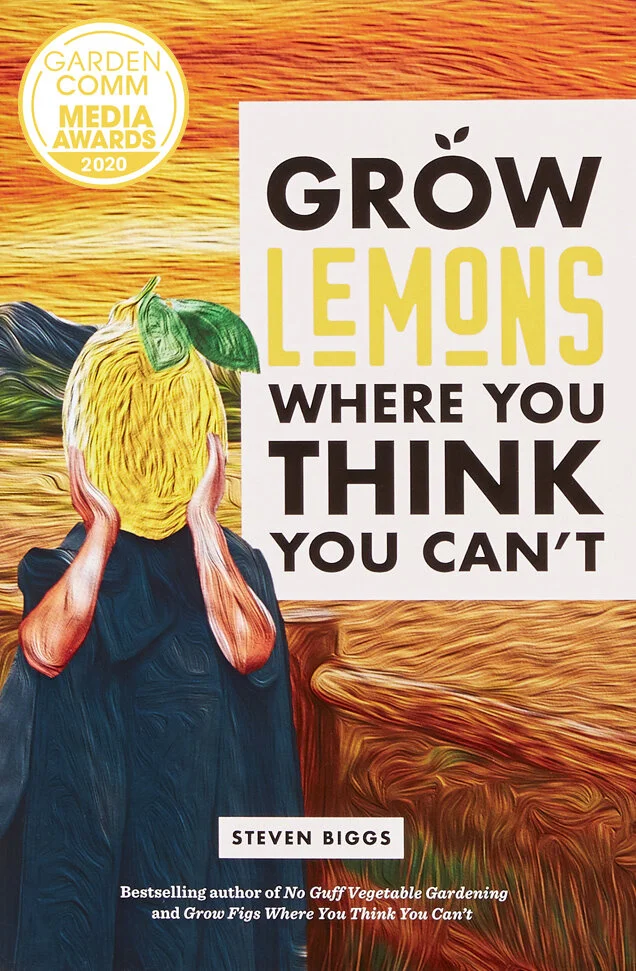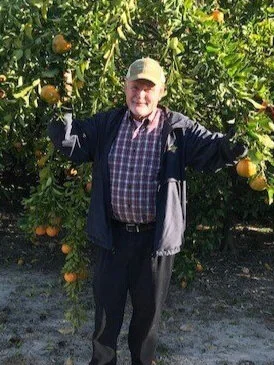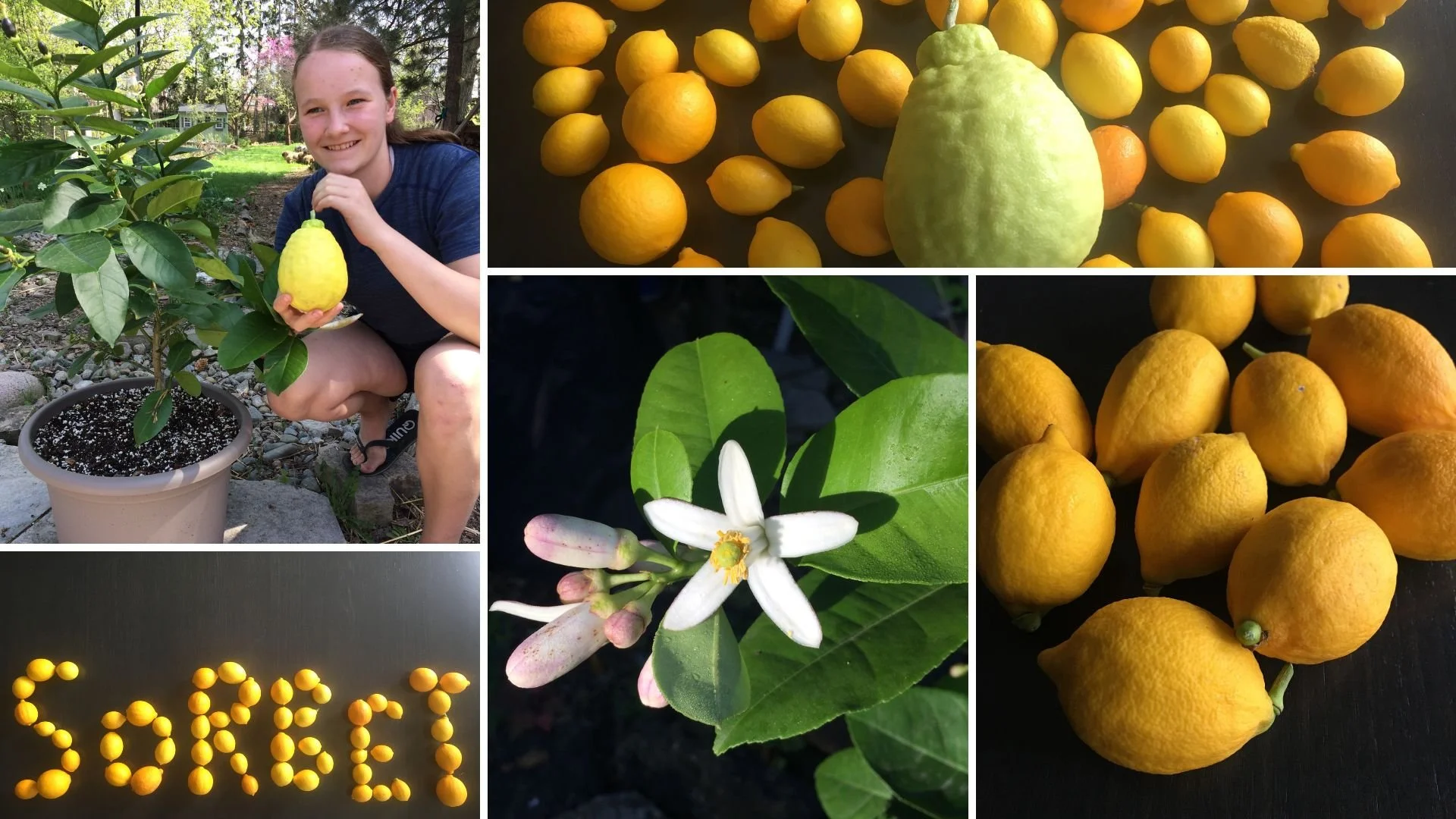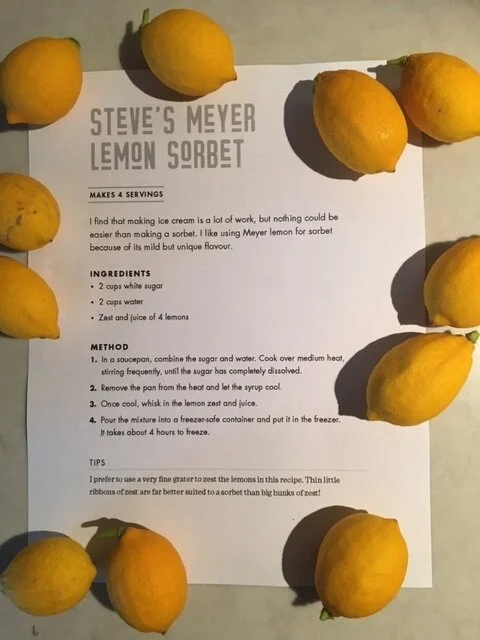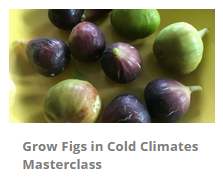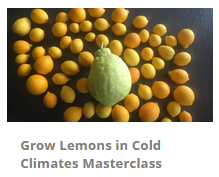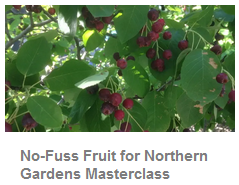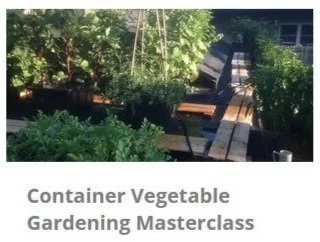Don't Feel Bitter about these Cold-Hardy Citrus
Fragrant cold-hardy citrus. Some you can even eat fresh off the tree. Find out about cold-hardy citrus and methods for growing citrus in cold climates.
Cold-Hardy Citrus with Fragrant Rind and Juicy Flesh
We chat with cold-hardy citrus expert Sam Hubert from One Green World Nursery.
Sam's interest in citrus began when he realized he could grow trifoliate orange in New England.
If you've tried trifoliate orange, you'll know it has true pucker power.
But don't worry!
Sam has lined up a mix of cold-hardy citrus: Along with fragrant and bitter citrus that add complexity to all sorts of recipes, he tells us about some eat-straight-from-the-tree cold-hardy citrus.
We talk about:
Trifoliate orange
Yuzu
Sudachi
Kumquat, and other citrus with kumquat lineage
Ichang lemon
Citrumello
Mandarins
Australian finger limes
Sam also shares tips about different ways to grow and protect citrus in cold climates.
Want More on Citrus?
Here’s an article to get you started with lemons:
Here are a couple of interviews with cold-climate citrus growers:
Covering everything from lemon varieties, to location and watering, to pruning and shaping, to overwintering, dealing with pests, and more—and including insights from fellow citrus enthusiasts—this book will give you the confidence you need to grow and harvest fresh lemons in cold climates.
Farming Cold-Hardy Citrus in South Carolina
The Johnny Appleseed of cold-hardy citrus, Stan McKenzie, joins us to talk about how to grow citrus in cold climates.
McKenzie talks about how he became a "citraholic" and started down the path of growing citrus on his USDA Zone 8 farm and nursery in South Carolina.
McKenzie Farms specializes in citrus suited for cold climates.
McKenzie says that he coined the term “citraholic” to describe people with a citrus-growing obsession. “It’s not really expensive, and the hangover isn’t nearly as bad,” he says with a laugh.
Getting Started in Cold-Hardy Citrus
He recalls his parents taking him to visit his grandmother when he was a child. Near her house was a scraggly tree that died back to the ground every winter. When he learned it was an orange tree, he was fascinated, and asked his dad to order citrus trees from Florida for their farm.
“Every one of them was killed the very first winter,” he says, explaining that he and his father didn’t know how to overwinter citrus.
Fast forward many years, while visiting Charleston, South Carolina, McKenzie saw a grapefruit tree loaded with golden grapefruit. “It lit the match again,” he says.
As he researched cold-hardy citrus he learned that satsuma trees are grown commercially in colder parts of Japan. It wasn’t long before he started growing satsuma. As his satsuma tree grew and prospered, everybody who saw the tree wanted one.
“That put me in the citrus business,” he says.
Cold-Hardy Citrus Tips
Overwintering Citrus Outdoors
McKenzie says that when overwintering in-ground citrus plants in borderline areas such as his, some citrus enthusiasts wrap the tree in a string of incandescent lights and then cover it with and insulating material. The lights give off enough heat to get the citrus plant through especially cold weather.
Another technique is “micromisting,” where a fine mist of water is sprayed over the trees. As the water freezes, it gives off heat—enough heat for the citrus plants to survive cold weather.
Overwintering Citrus Indoors
Where winter temperatures are more severe, people often bring potted citrus plants into the house over the winter. McKenzie says that the biggest challenge with this technique is that the air in most homes is too dry, causing the plants to drop leaves. The well-known Meyer lemon is especially finicky, he says. However, leaves will grow back in spring.
To maintain a higher humidity that is better suited to citrus plants, he recommends filling a tray (such as the foil trays sold for roasting turkeys) with pebbles and water. He says that spritzing with water regularly helps too.
Top Questions
Thorny growth at the base of the plant. McKenzie explains that many citrus are grafted onto a rootstock of trifoliate orange—a very thorny plant. Sometimes that root will send up a shoot, which, if left to grow, it will overtake the desired variety grafted onto it.
Wrinkled leaves and squiggly lines. He says that this is caused by an insect pest called the citrus leaf miner, which tunnels inside the leaf. While unsightly, they do no harm to the plant and do not affect the fruit.
Common Cold-Hardy Citrus
Prague Satsuma. This hardy satsuma survived the 8°F (-13°C) weater that killed many of the other satsuma varieties in his orchard.
Thomasville Citrangequat. McKenzie says that this cold-hardy citrus is a good lime substitute.
Crosses with trifoliate orange. He says there are many crosses with trifoliate orange that have excellent cold hardiness, but the fruit is usually bitter.
Yuzu, aka Japanese lemon, is very cold-hardy. He knows of people growing this citrus in colder areas such as Raleigh, North Carolina.
Poncirus Trifoliata (a.k.a. Trifoliate Orange)
The trifoliate orange, also known as trifoliate lemon and Poncirus, is extremely hardy, surviving in areas colder than USDA Zone 7. It is a common rootstock. McKenzie says that the small fruit are very seedy and bitter.
Connect with Stan McKenzie
Website: mckenzie-farms.com
Facebook: McKenzie-Farms-Nursery-174405135904728
Find Out How to Grow Your Own Lemons
Grow Lemons in Cold Climates Masterclass shows you how to grow a lemon tree in a pot or outside with protection. And get lemons!
Looking for More Citrus Information?
Growing Citrus in Vancouver
Growing in-ground Meyer lemons, limes, and tangerines in Vancouver.
Greg Neal from North Vancouver tells us how he got the bug for growing citrus.
At last count he had 19 varieties around his suburban yard, some in the ground, some in pots, and some in his greenhouse.
He takes delight in seeing the look of surprise on the face of delivery people who notice lemons, tangerines, and limes growing in his front yard.
Lemons in Cold Climates
Neal says that memories of lemons growing around his aunt’s California yard inspired him to look into growing lemons at home.
He learned that Meyer lemons are quite cold hardy, and, seeing Meyer lemon plants for sale in 2006, came home with three plants.
He kept one plant in the house; it died. But the two that he stored in his cold garage for the winter lived.
He now grows Meyer lemon directly in the ground, covering it with a string of incandescent lights and fabric for winter protection. The lights emit just enough heat to get the plant through the coldest days.
He explains that the fruit takes about one year to mature—so it’s important to protect it from freezing over the winter.
His top tip for would-be lemon growers is not to grow them indoors.
Poncirus Trifoliata (a.k.a. Trifoliate Orange)
Neal grows trifoliate orange, which he says is mainly an ornamental.
Neal also grows trifoliate orange in his yard.
He explains that it is the most cold hardy of the citrus.
Unlike lemon, it drops its leaves for the winter.
With a laugh he says that some varieties of trifoliate orange are “sort of” edible, while with others, you think you’re being poisoned.
More on Cold-Climate Lemons
Looking for more information about growing lemons in cold climates? Head over to the Lemon Home Page.
Find Out How to Grow Your Own Lemons
Grow Lemons in Cold Climates Masterclass shows you how to grow a lemon tree in a pot or outside with protection. And get lemons!
Book: Growing Lemons in Cold Climates
If you’ve ever wanted to grow a lemon in a pot (or, in the ground if you’re in a borderline area), this book tells you how!
Grow a Meyer Lemon in a Pot
Meyer lemon sorbet recipe from the book Grow Lemons Where You Think You Can’t
Emma made Meyer lemon sorbet yesterday.
She made it with home-grown Meyer lemons, picked in Toronto in the month of May.
Steven has grown lemons since the 1990s—but it was a visit to Bob Duncan at Fruit Trees and More Nursery in British Columbia that inspired him to write his book Grow Lemons Where You Think You Can’t.
Victoria has a mild climate, so Bob grows lemons espaliered on the side of his house. Over the winter, he used incandescent light strings and row-cover fabric to protect the lemon trees.
Steven and Emma dig into growing lemons in colder climates—and why lemons are an idea container plant.
Did you know that in addition to the fruit, you can use lemon leaves in the kitchen?
There are many ways to keep lemon trees over the winter, even without a greenhouse or a bright south-facing window.
Find Out How to Grow Your Own Lemons
Grow Lemons in Cold Climates Masterclass shows you how to grow a lemon tree in a pot or outside with protection. And get lemons!
More Lemon Growing Information
Lemon Book
Ever thought about growing a lemon tree in a pot? This book tells you how.


